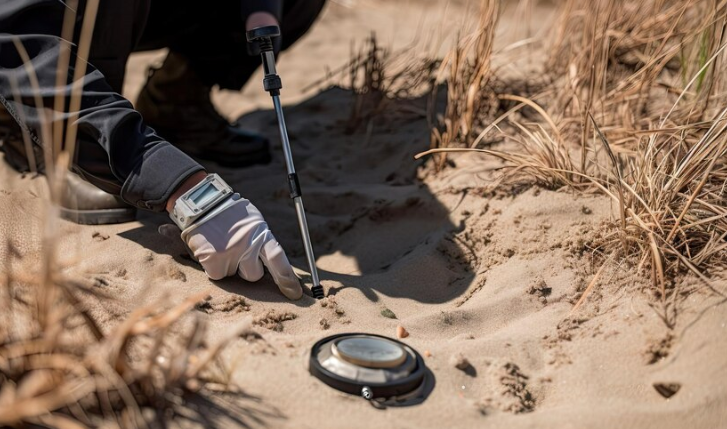El aluminio es un elemento estándar en muchos artículos de uso diario, pero ¿hace sonar los detectores de metales? Esta pregunta es relevante para quienes se encuentran con frecuencia en controles de seguridad o utilizan detectores de metales como pasatiempo. Comprender cómo interactúa el aluminio con los detectores de metales puede ayudarlo a sortear estas situaciones con mayor facilidad.
Encuentros cotidianos con detectores de aluminio y metales
A diario nos encontramos con aluminio en diversas formas, desde artículos para el hogar hasta dispositivos personales. Estos encuentros se vuelven particularmente relevantes al pasar por detectores de metales en aeropuertos o edificios públicos. Comprender cómo interactúa el aluminio con estos dispositivos de seguridad puede ayudarlo a afrontar estas situaciones con mayor fluidez.
Artículos comunes que contienen aluminio
El aluminio está en todas partes y se presenta en diversas formas que quizás solo consideremos a veces. Los artículos típicos incluyen papel de aluminio, latas de bebidas y ciertos tipos de envases. Incluso los objetos cotidianos como llaves, teléfonos inteligentes y computadoras portátiles a menudo contienen componentes de aluminio. Comprender la presencia de aluminio en estos artículos puede ayudarlo a anticipar cuándo podría activar un detector de metales. Por ejemplo, saber cuáles de sus pertenencias pueden activar la alarma es útil al pasar por el control de seguridad en un aeropuerto o evento.
Aeropuertos, escuelas y edificios públicos
Los detectores de metales son una medida de seguridad estándar en aeropuertos, escuelas y edificios públicos. Estos detectores pueden identificar objetos metálicos para garantizar la seguridad de todas las personas que se encuentren en las inmediaciones. Los artículos de aluminio pueden activar la alarma cuando pasa por un detector de metales en el aeropuerto o ingresa a un edificio escolar. Si sabe esto, puede prepararse colocando dichos artículos en las bandejas designadas para su inspección. Este conocimiento acelera el proceso de seguridad y reduce la probabilidad de falsas alarmas, lo que hace que su experiencia sea más fluida y eficiente.
Diferentes escenarios con detectores de metales
Muchos utilizan detectores de metales en distintos entornos, cada uno de los cuales presenta desafíos y consideraciones únicos. Desde controles de seguridad en eventos importantes hasta actividades personales de aficionados, la forma en que los usuarios utilizan los detectores de metales puede variar ampliamente. Explorar estos diferentes escenarios puede brindar información valiosa para optimizar su uso y mejorar la precisión de la detección.
Controles de seguridad en eventos
Los controles de seguridad en los eventos suelen incluir detectores de metales para garantizar la seguridad de los asistentes. Los conciertos, eventos deportivos y grandes reuniones suelen tener medidas de seguridad estrictas. Los artículos como latas de bebidas de aluminio o aperitivos envueltos en papel de aluminio pueden activar estos detectores. Es mejor tener cuidado con lo que llevas y considerar la posibilidad de quitarte cualquier artículo que contenga aluminio antes de pasar por el control de seguridad para evitar retrasos y molestias. Hacerlo te ayudará a pasar por el control de seguridad más rápidamente y ayudará al personal a mantener un entorno seguro para todos.
Uso personal para aficionados
Comprender cómo afecta el aluminio a los detectores de metales es fundamental para los aficionados que disfrutan de la búsqueda de tesoros. Los detectores de metales detectan varios metales, incluido el aluminio. Cuando busque tesoros en parques, playas o sitios históricos, es probable que encuentre aluminio en forma de latas desechadas, papel de aluminio u otros desechos. Saber esto le ayudará a distinguir entre posibles tesoros y basura común. El uso de accesorios de detección de metales de calidad también puede mejorar la precisión de la búsqueda. Si compra detectores de metales en línea , busque modelos con funciones de discriminación avanzadas para filtrar las señales de aluminio no deseadas, lo que hará que su búsqueda de tesoros sea más eficiente y agradable.
Cómo evitar falsas alarmas y mejorar la precisión de la detección
Las falsas alarmas pueden ser un problema común al utilizar detectores de metales, a menudo provocadas por elementos cotidianos como el aluminio. Comprender cómo evitar estas falsas alarmas y mejorar la precisión de la detección puede mejorar su experiencia y eficiencia.
Entendiendo las falsas alarmas
Las falsas alarmas se producen cuando los detectores de metales identifican por error elementos no amenazantes como amenazas a la seguridad. El aluminio es un culpable frecuente debido a su uso generalizado en envases, latas y productos electrónicos. Por ejemplo, elementos como papel de aluminio o latas de bebidas pueden activar el dispositivo cuando se utiliza un detector de metales Garrett , lo que genera alertas innecesarias. Las falsas alarmas pueden ser frustrantes y consumir mucho tiempo, especialmente en áreas de alta seguridad como aeropuertos o en eventos importantes. Si comprende qué causa estas falsas alarmas, puede tomar medidas para minimizar su aparición. La conciencia y la preparación garantizan un proceso de detección más fluido y preciso.
Guía del usuario para evitar falsas alarmas
Debes tener cuidado con los objetos que llevas y con el modo en que utilizas el detector de metales para evitar falsas alarmas. En primer lugar, retira cualquier objeto que parezca contener aluminio antes de pasar por los controles de seguridad. Ajusta la sensibilidad para filtrar los objetos de aluminio de uso cotidiano cuando utilices un detector de metales para uso personal. Invertir en accesorios de calidad para la detección de metales también puede ayudar a mejorar la precisión de la detección. Además, cuando compres detectores de metales en línea, busca modelos con funciones de discriminación avanzadas que te permitan ajustar la respuesta del detector a diferentes metales. Estos pasos pueden reducir significativamente la cantidad de falsas alarmas y mejorar tu experiencia general con la detección de metales.
Cómo instalar un detector de metales por seguridad
La instalación de un detector de metales por motivos de seguridad requiere una calibración cuidadosa y un mantenimiento regular para garantizar que funcione con precisión y eficiencia.
Configuración de calibración y sensibilidad
Una calibración adecuada es fundamental para la precisión de un detector de metales. Comience por configurar la sensibilidad a un nivel óptimo que equilibre la capacidad de detección con la minimización de falsas alarmas. Una sensibilidad alta puede detectar objetos pequeños y sin importancia, como papel de aluminio, mientras que una sensibilidad demasiado baja puede pasar por alto objetos críticos. Siga las pautas del fabricante, principalmente si utiliza modelos confiables como un detector de metales Garrett. Pruebe el detector con varios objetos metálicos, incluido el aluminio, para ajustar la configuración hasta lograr el equilibrio deseado. Recalibre regularmente el detector para tener en cuenta los cambios ambientales o de uso, a fin de garantizar un rendimiento constante.
Mantenimiento y pruebas regulares
El mantenimiento del detector de metales implica una limpieza regular, la comprobación del desgaste y la comprobación de la precisión. El polvo y los residuos pueden afectar al rendimiento del detector, por lo que es recomendable limpiar las bobinas y otros componentes de forma rutinaria. Debe realizar pruebas periódicas con diversos objetos metálicos, incluido el aluminio, para asegurarse de que el detector responda correctamente. Si utiliza el detector de metales en exteriores o en entornos hostiles, considere invertir en un detector de metales resistente al agua para una mayor durabilidad. Un registro de mantenimiento puede ayudar a realizar un seguimiento de los problemas y garantizar reparaciones o ajustes oportunos. El rendimiento confiable de su detector de metales mejora la seguridad y reduce la probabilidad de detecciones fallidas o falsas alarmas.
La ciencia detrás de los detectores de metales y el aluminio
Comprender cómo funcionan los detectores de metales y su interacción con el aluminio puede mejorar su capacidad para usarlos de manera eficaz. A continuación, se presenta una descripción de la ciencia detrás de la detección de metales y los detalles de la detección de metales no ferrosos como el aluminio.
Cómo funcionan los detectores de metales
Los detectores de metales estándar utilizan campos electromagnéticos para detectar objetos metálicos. El detector emite una señal electromagnética desde su bobina, que interactúa con los objetos metálicos cercanos. Cuando esta señal choca con un objeto metálico, crea un campo electromagnético propio, que la bobina receptora del detector capta. Esta interacción procesada se traduce en una alerta audible o un indicador visual. Marcas como Garrett son reconocidas por su tecnología avanzada que mejora la precisión de detección. Comprender este proceso ayuda a ajustar la configuración para diferenciar entre metales y evitar falsas alarmas, especialmente en entornos con metales comunes como el aluminio.
Detección de metales no ferrosos
Los metales no ferrosos, como el aluminio, no contienen hierro y tienen propiedades no magnéticas, lo que los hace detectables pero a veces más difíciles de distinguir de otros materiales. Los detectores de metales pueden identificar estos metales por sus propiedades de conductividad únicas. El aluminio, por ejemplo, tiene una alta conductividad, que puede activar los detectores de metales, por lo que los artículos de aluminio como las latas o el papel de aluminio suelen activarlos. Busque modelos con funciones de discriminación avanzadas cuando compre detectores de metales en línea. Estas funciones permiten que el detector diferencie entre metales ferrosos y no ferrosos, lo que mejora la precisión de la detección y reduce las alertas innecesarias.
Detectores de metales de Treasure Coast: facilitando el camino a los pioneros de las innovaciones futuras
Treasure Coast Metal Detectors es una reconocida fuente de marcas de detectores de metales que están a la vanguardia de la innovación. Ofrecemos productos que incluyen características y tecnología avanzadas para mejorar su experiencia de detección de metales.
Funciones y tecnología avanzadas
Los detectores de metales que ofrece Treasure Coast cuentan con tecnología de vanguardia, que incluye configuraciones de discriminación avanzadas, altos niveles de sensibilidad y opciones de impermeabilidad para diversos entornos. Estas características garantizan una detección precisa y un funcionamiento sencillo, lo que los hace ideales para aficionados y profesionales. Ya sea que esté buscando un tesoro en la tierra o bajo el agua, nuestra gama de detectores le brinda la confiabilidad y precisión necesarias para una búsqueda exitosa.
Compromiso con la satisfacción del cliente
En Treasure Coast, la satisfacción del cliente es primordial. Ofrecemos asistencia integral para todas las marcas que figuran en la lista, desde ayudarlo a elegir el detector adecuado hasta brindarle consejos de mantenimiento constante. Nuestro compromiso con la calidad garantiza que obtenga el mejor rendimiento de su detector de metales, lo que mejora su experiencia general. Treasure Coast sigue siendo una fuente confiable en la comunidad de detección de metales al priorizar las necesidades del cliente y ofrecer continuamente productos innovadores.
Conclusión
Comprender cómo interactúa el aluminio con la mayoría de los detectores de metales puede mejorar la precisión y la experiencia de detección. Ya sea por seguridad o por pasatiempo, elegir un detector de metales confiable de Treasure Coast garantiza precisión y satisfacción. Explore las numerosas opciones avanzadas que ofrecemos para mejorar sus aventuras de detección de metales.




Dejar un comentario